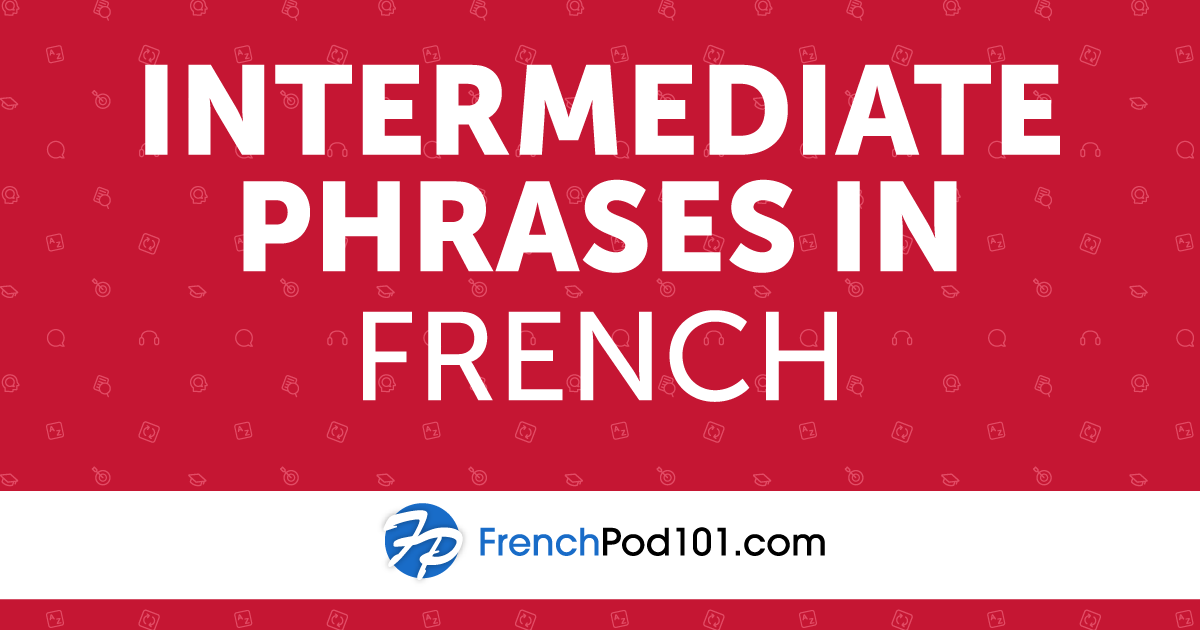
Are you having trouble bridging the gap from beginner to intermediate level? It can feel like a daunting task when you have to leave the comfort of simple structures in the present tense. This is especially true once you start treading the uncharted grounds of expressing complex ideas or subtle feelings.
But once you’re confident with the basics and realize the only way is up, you’ll find a lot of satisfaction in honing your skills on something a bit more challenging (like the intermediate French phrases introduced in this article). And I say “a bit” because French has this weird tendency to look way more complicated than it actually is.
The tenses, for example, are not nearly as overwhelming as they seem at first glance. With only a couple of them (namely: passé composé and futur proche), you’ll be surprised how fast you can progress and how much you can express. Similarly, the French conjunctions are numerous, but many of them have direct English equivalents and are used exactly the same way.
In this article, we’ll have a look at some of the most useful structures with over 50 examples of common intermediate French phrases. Learning these structures will allow you to talk about past events, make plans for the future, explain your reasons, and more.
 Table of Contents
Table of Contents
- Anecdotes and Stories
- Let’s Make Plans
- A Few Reasons Why
- Praise and Complain
- Are You Kidding Me?
- Yes, Milord
- Le mot de la fin
1. Anecdotes and Stories
When you’re beginning with French, chances are you’ll only use the present tense for a while. Even when telling stories about past events or interesting experiences you’ve had, you can often get away with using the present tense. Sometimes, even native speakers do this in order to make the story more vivid and engaging.
However, unless you’re fluently and seamlessly handling the transition, doing so can create this awkward moment when your audience is trying to place your anecdote and adapt to the uncommon choice of tense. In most cases, I’d say that using the past tense is a better choice, and learning how to juggle between its different forms will be well worth your time.
Here are a few simple French phrases for the intermediate level that make use of the past tense.
| C’était une très bonne soirée ! |
| That was a really good night! |
| On a passé un super moment. |
| We had a great time. |
| Literally: We have passed a great moment. |
| On s’est bien amusés ! |
| We had fun! |
| Literally: We entertained ourselves well! |
| C’était le pire jour de ma vie. |
| That was the worst day of my life. |
| Je travaille ici depuis deux ans et demi. |
| I’ve been working here for two and a half years. |
| Literally: I work here since two years and a half. This sentence uses the present tense because we’re talking about something that is still ongoing. I am working here (present), and this action started two and a half years ago. |
| L’année dernière, j’ai voyagé en Argentine. |
| Last year, I traveled to Argentina. |
| J’ai fait du Karaté pendant deux ans. |
| I’ve practiced karate for two years. |
| Literally: I have done karate during two years. |
- ➜ There are many different forms of the past tense in French, but luckily, only a few are ever used in conversations. Be sure to stop by our complete guide to French tenses, freely available on FrenchPod101.com.

C’était une très bonne soirée ! (“That was a really good night!”)
2. Let’s Make Plans
Now that you have a better grasp on the past, let’s jump back to the future. As you’ll see, there are many different options, and the future tense is not often mandatory. Using its different forms is quite simple, though, and I’d recommend that you give them a try!
Usually, mentioning the date of the event will be enough for the other person to understand that you’re talking about the future. From that point on, whether you use the present, future, near future, or conditional is a matter of preference.
| Est-ce que vous seriez disponible la semaine prochaine ? [Formal] |
| Would you be available next week? |
| Literally: Is it that you would be available the next week? |
| Tu seras dispo dimanche ? [Casual] |
| Will you be available on Sunday? |
| Literally: You will be available on Sunday? |
| Vous voulez manger japonais ? [Formal] |
| Would you like to eat Japanese? |
| Ça te dit de manger japonais ? [Casual] |
| Would you like to eat Japanese? |
| Literally: Does it tell you to eat Japanese? |
| On se fait un jap ? [Very Casual] |
| Care for some Japanese food? |
| Literally: Are we doing ourselves a Jap? |
| Je peux venir avec mon copain ? / Je peux venir avec ma copine ? |
| Can I come with my boyfriend? / Can I come with my girlfriend? |
| On peut reporter à la semaine prochaine ? |
| Can we postpone it to next week? |
| Literally: We can postpone to next week? |
| On en discutera plus tard en réunion. |
| We will discuss it later in a meeting. |

On se voit dimanche ? (“Shall we meet on Sunday?”)
- ➜ We’re just scratching the surface here. If you want to learn how to talk more about your plans, this free vocabulary list is just what you need.
3. A Few Reasons Why
Stating facts or describing things that you’ve done is a great start, but your conversations will get much more interesting once you can explain your actions and understand people’s motivations. It can be as simple as saying that you don’t want dessert because you’re full, or as complex as elaborating on your tastes in music or movies.
Describing your reasons is quite straightforward in French. You just need a few key intermediate French words and phrases, and you’ll be able to talk about causes and consequences.
| Je ne mange ni œufs ni poisson car je suis allergique. |
| I eat neither eggs nor fish because I’m allergic. |
| J’espère que tu viens ce soir, sinon tu vas me manquer. |
| I hope you’re coming tonight, or I will miss you. |
| Literally: I hope that you come tonight, otherwise I will miss you. |
| J’aime cette musique parce qu’elle me détend. |
| I love this music because it relaxes me. |
| J’ai un peu bu, alors je vais rentrer à pied. |
| I’ve been drinking a little, so I’ll walk back home. |
| Literally: I have drunk a little, so I will go back on foot. |
| Comme j’étais épuisé, j’ai dormi jusqu’à midi. |
| Because I was exhausted, I slept until noon. |
| Je parle doucement pour ne pas la réveiller. |
| I’m speaking softly so I won’t wake her up. |
| J’ai choisi cette ville pour trois raisons : D’abord, sa taille, ensuite, son climat, mais surtout pour ses bars ! |
| I chose this city for three reasons: First of all, its size; secondly, its weather; but most of all, for its bars! |

J’ai dormi jusqu’à midi car j’étais épuisé. (“I slept until noon because I was exhausted.”)
- ➜ Learning more conjunctions is one of the best ways to start creating elaborate and interesting sentences. Feel free to check our extensive guide to French conjunctions on FrenchPod101.com.
4. Praise and Complain
Sharing our opinions and insights helps us create bonds and allows us to learn from each other’s experiences. Whether you want to recommend something or discourage your friends from anything terrible, you can do so using these useful French phrases and patterns.
| C’est mon cinéma préféré. |
| This is my favorite movie theater. |
You can use this sentence pattern with anything. You should just keep in mind that préféré agrees with the object in both gender and number.
- C’est ma musique préférée. (“This is my favorite music.”)
- Ce sont mes films préférés. (“These are my favorite movies.”)
- Ce sont mes séries préférées. (“These are my favorite series.”)
| C’est le meilleur film d’action depuis John Wick. |
| This is the best action movie since John Wick. |
| C’est la meilleure adresse pour manger japonais. |
| This is the best address to eat Japanese food. |
| Je te conseille de le voir en version originale. [Casual] | Je vous conseille de le voir en version originale. [Formal] |
| I recommend that you see the original version. | |
| J’ai beaucoup aimé ce film, je le reverrais avec plaisir. |
| I really enjoyed this movie. I would gladly watch it again. |
| Literally: I have really liked this movie. I would see it again with pleasure. |
The conditional form is a bit tricky here. It sounds exactly like the future je le reverrai, and only the spelling is different. You can find the conjugation of the verb revoir over here.
| La suite est très mauvaise. À éviter à tout prix. |
| The sequel is really bad. To be avoided at all costs. |

C’est mon livre préféré ! (“This is my favorite book!”)
- ➜ In France, we love constructive criticism and—okay, fine, we love to complain! We go on and on about what we dislike and why it’s so terrible. If you want to join in on our verbal jousting, get some ammunition from our free vocabulary list on expressing dislike!
5. Are You Kidding Me?
Let’s change the tempo with some short conversation examples. In this section, you’ll learn how you can react to different statements and express enthusiasm, annoyance, curiosity, or disbelief.
On your road to fluency, being able to express interesting and nuanced reactions (rather than just saying yes or no) is a great step forward that will add a lot of flavor to your conversations.
1 – Great!
A: J’aime beaucoup la série que tu m’as conseillée. (“I really love the series you recommended to me.”)
B: C’est cool, je suis content que ça te plaise. (“That’s great. I’m glad you like it!”)
2 – Sorry.
A: Je suis allergique au poisson. (“I’m allergic to fish.”)
B: Oh, désolé, je ne savais pas. (“Oh, sorry, I didn’t know.”)
3 – I can’t believe it.
A: Je n’aime pas le fromage. (“I don’t like cheese.”)
B: Sérieusement ? (“Seriously?”) [Formal or Casual]
B: T’es sérieux ? (“Are you serious?”) [Casual]
B: Tu rigoles ? (“You kidding me?”) [Casual]
B: C’est pas vrai ! (“No way!”) [Formal or Casual]
B: N’importe quoi… (“Whatever…”) [Mostly Casual]
4 – That’s bad.
A: Je ne peux pas venir ce soir. (“I can’t come tonight.”)
B: Oh, c’est dommage. (“Oh, that’s a shame.”) [Formal or Casual]
B: Ah, c’est nul ! (“Ah, that sucks!”) [Mostly Casual]
5 – Keep me posted!
A: Je ne sais pas si je pourrai venir ce soir. (“I don’t know if I can come tonight.”)
B: OK, tenez-moi au courant ! (“Alright, keep me posted!”) [Formal]
B: Ok, tiens-moi au courant ! (“Alright, keep me posted!”) [Casual]
6. Yes, Milord
France is known for its exquisite etiquette and its slight obsession with polite protocol, so you bet there’s more to it than just s’il vous plaît (“please”) and merci (“thank you”).
Sure, these two expressions will take you a long way, especially if you stick to casual settings and relaxed, friendly gatherings. But as soon as you step into the business world or any formal event, you’ll be glad to have learned more. And even among friends, pleasantries never hurt!
Below are several polite French phrases for the intermediate level.
| Bon appétit. |
| Enjoy your meal. |
| Literally: Good appetite. |
| Faites comme chez vous. [Formal] | Fais comme chez toi. [Casual] |
| Make yourself at home. | |
| Literally: Do like at your home. | |
| Profitez bien de vos vacances ! [Formal] | Profite bien de tes vacances ! [Casual] |
| Enjoy your vacation! | |
| Bon voyage ! |
| Enjoy your trip! |
| Literally: Good travel! |
| C’était un plaisir. |
| That was a pleasure. |
| Excusez-moi de vous déranger. [Formal] |
| I’m sorry to disturb you. |
| Literally: Excuse me for disturbing you. |
| À la vôtre ! [Formal] | À la tienne ! [Casual] |
| Cheers! | |
| Literally: To yours! This is a shortened version of À votre santé ! [Formal] / À ta santé ! [Casual] (“To your health!”) I personally prefer the shortened version, but it’s a matter of taste. | |
| À vos souhaits. [Formal] | À tes souhaits. [Casual] |
| Bless you. | |
| Literally: To your wishes. This is used when someone is sneezing. If they do it again, you could add à tes amours (“to your loves”) but it’s old-fashioned and mostly used as a joke. | |

Fais comme chez toi ! (“Make yourself at home!”)
- ➜ This is just the tip of the iceberg, but if you’re interested in the topic of French etiquette, you’re in luck! We have a complete guide on how to be polite in France. It’s freely available on FrenchPod101.com.
7. Le mot de la fin
In this guide, you have learned a lot of intermediate French phrases with over 50 common examples covering various aspects of our daily lives.
Did we forget any important topic or some specific structures you’d like to learn about? Feel free to share it in the comments below!
To practice what you learned from our list of intermediate French phrases, I’d recommend following these steps:
- Read the sentence carefully and see if you can understand it.
- Try and translate it yourself using the words and grammar that you already know.
- Compare your results to the given translation (and to its literal translation, when needed).
- Once you understand the words and the grammatical structure, you can make some changes to the sentence to make it more personal.
- Once you’re comfortable enough, you could even try to rephrase it completely or to make it more complex.
Make sure to explore FrenchPod101.com, as we have plenty of free resources to help you practice your grammar and learn new words. Our vocabulary lists are also a great way to review words and learn their pronunciation.
Remember that you can also use our Premium PLUS service, MyTeacher, to get personal 1-on-1 coaching with your own private teacher. They can help you practice with the intermediate phrases you’ll come up with as you work through this list. In addition, your teacher can give you assignments, provide you with personalized exercises, and record audio samples just for you; they can then review your work and help improve your pronunciation.
Happy learning with FrenchPod101!
About the Author: Born and bred in rainy Northern France, Cyril Danon was bouncing off various jobs before he left everything behind to wander around the wonders of the world. Now, after quenching his wanderlust over the last few years, he’s eager to share his passion for languages.










